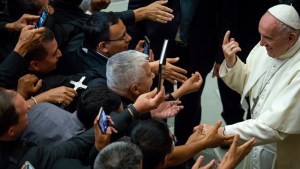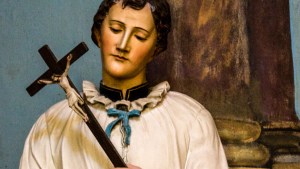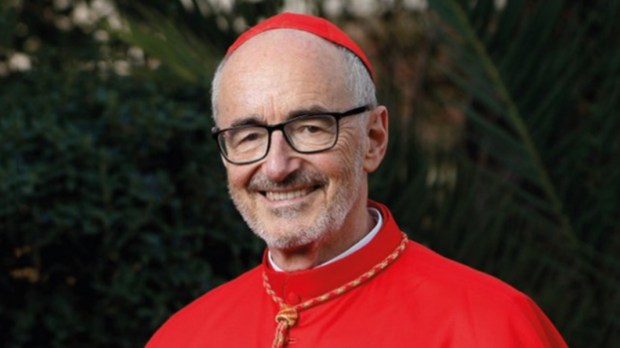“I was hungry, and you gave me to eat; I was thirsty, and you gave me to drink; I was a foreigner, and you welcomed me.” These words of Jesus are the program that Pope Francis has entrusted to one of the new cardinals created on October 5: Jesuit priest Michael Czerny.
This quote from the Gospel According to Matthew (25:35) is precisely the reason for the existence of the Vatican’s Migrants and Refugees office, of which Father Czerny has until now been the Under-Secretary. This Vatican section was created and is directed by the pope himself, an exceptional case in today’s Church government.
Michael Czerny was born on July 18, 1946, in Brno, Czechoslovakia (today the Czech Republic). When he was only two years old, his parents emigrated to Canada with him and his younger brother—a baby just a few months old—in the face of the threat of Communist totalitarianism.
After joining the Company of Jesus, he was ordained a priest on June 9, 1973. He founded the Jesuit Centre for Social Faith and Justice in Toronto, which he directed from 1979 to 1989. Then, after the assassination of Jesuits at the José Simeon Cañas Central American University in El Salvador, he took on the role of vice-rector of the university and directed its human rights institute.

Read more:
Pope draws lessons for Salvadorans from life of St. Romero
Between 1987 and 1988, he lived for several months in Czechoslovakia and in the Community of L’Arche, in Trosly-Breuil, France, founded by Jean Vanier.
Since 1992, he has been all around the world, first as head of the Secretariat for Social Justice of the Jesuit Curia in Rome, and then as the founding director of the African Jesuit AIDS Network.
He returned to Rome from 2010 to 2016 to be the personal assistant/consultant of Cardinal Peter Turkson, the president of the Pontifical Council for Justice and Peace. Currently, he’s also one of the two special secretaries of the special Synod of Bishops for the Amazon, which is taking place now at the Vatican.
Aleteia: How did you receive your faith in Jesus? When did Christ become the meaning of your life?
Cardinal Czerny: I received my faith from my family, from my Catholic school, and from the communities where I grew up. Rather than specifying the moment in which Christ became the center of my life, I think that instead, rooted in a good Catholic formation, I gradually discovered throughout the years that Christ is the center of my life, and I discovered it through experiences, witnesses to the faith, choices, and in my own prayer life.
When and how did you understand that God was calling you to leave everything and to follow him on the path of religious life, specifically as a Jesuit?
Cardinal Czerny: The call arrived early in my life, when I was still a student at Loyola High School in Montreal, and just after graduation, I entered the Jesuits in what was then called the Province of Upper Canada.
I felt a strong desire to serve God and my neighbor in the community, to use the talents God had given me, and to live in freedom. That was what I was hoping to be able to do when I entered the Jesuits.
Have you ever had doubts about your faith? Have you doubted at any time your religious vocation?
Cardinal Czerny: Of course, you have doubts, but they don’t contradict your faith. The true danger (regarding the faith) is fear: you really need God’s grace not to let yourself be dominated or ruled by fear, but to go beyond your fears towards a greater faith in God; towards the church… And this growth, fortunately, also means growing in hope.
What can you tell us about your university studies and your intellectual formation?
Cardinal Czerny: I did my postgraduate studies at the University of Chicago. I signed up for an interdisciplinary and innovative program called “Committee on the Analysis of Ideas and Study of Methods.”
Its founder was Professor Richard McKeon, a renowned Aristotelian academic who, in the end, directed my doctoral thesis. The courses he gave were, above all, on philosophy, theology, and contemporary social theory.
Pope Saint Paul VI was an important inspiration for me at that time, when he called the Jesuits to study what he called “the fearful danger of atheism threatening human society” that “advances and spreads under many forms.”
For this reason, my investigative work was oriented towards studying the causes of atheism present in communism, in authors such as Marx and Feuerbach. This request from the pope and what I studied during those years were of special interest to me, since my own family, due to atheist Communism, had to emigrate from Czechoslovakia to Canada when my brother and I were very young.
When you began your priestly ministry, you founded the Jesuit Centre for Social Faith and Justice in Toronto in 1979. Right after the assassination of the Jesuits at the Central American University of El Salvador in 1989, you arrived as the vice-president of that Jesuit university and as the director of its Human Rights Institute. What did you learn from such a traumatic experience?
Cardinal Czerny: First, I should say that after the murder of my Jesuit Brothers, the Province of Central America went through some of the most difficult moments in its history. The Superior General of the Company of Jesus wrote to all the Jesuits asking for volunteers to go to El Salvador, to that frontier.
Many Jesuits offered to take on that difficult mission. Perhaps this was an important initial experience — feeling and corroborating that we Jesuits were truly willing to go where we were needed, or where others could not go.
I was sent by my provincial superior, along with all the body of the Company of Jesus, and the Church in Canada, to participate in that moment of crisis and of slow resurrection.
Rather than “traumatic,” it was a true experience of accompanying Christ in His Passion, His death, His Resurrection, in His Church, and in His people. In the face of death and injustice, much more life emerged, much solidarity, many signs that God was with us … All of that during the Civil War that ended—also thanks to the sacrifice of the Jesuits—two years later.
You spent another part of your priestly ministry in the heart of the general Curia of the Company of Jesus and of the Holy See, attending to extremely difficult human situations : AIDS, refugees, migratory crises … Why do you think that God is asking you to dedicate your ministry to these people?
Cardinal Czerny: Yes, from 2002 to 2010, I lived and worked in Africa, as part of the response of the Church and the Company of Jesus to HIV/AIDS. It fell to me, together with others, to found AJAN (African Jesuit AIDS Network).
The Jesuits are men of networking, connecting the centers with the peripheries: always missionaries. Before AJAN, my Ministry had been based first at the General Curia of the Jesuits; afterwards, at the Holy See; but my task was always to work with and to walk on frontiers in movement—not only geographical ones, but also cultural, social, and human ones.
I believe that God is calling us to walk alongside so many people because He always hears the cry of His people. The cry of many of these people has been a strong cry for justice, for inclusion, for respect and for peace. God replies, calling us to participate in His response with creativity and discernment.

Read more:
St. Aloysius Gonzaga, the patron saint of AIDS patients, died helping plague victims
Starting in 2016, Pope Francis entrusted you with helping him in directing the Migrants and Refugees Section of the Vatican Dicastery for Promoting Integral Human Development. It’s a section that the Pope himself directs personally. What are the guidelines you’ve received from the pope for carrying out such a complicated mission?
Cardinal Czerny: To listen, communicate, accompany, collaborate, and respond to the needs of local Churches, as best as I possibly can.
During these years, you’ve been able to see the faces of men and women who really suffer. Don’t you feel impotent when you look them in the eyes? What can you do for them? What can the Church do for them?
Cardinal Czerny: If I thought that “everything depends on me and I’m alone,” I couldn’t look them in the eyes. I would feel frustrated by the little that I do or am able to do. I understand that I’m only a collaborator in God’s mission, that God is the protagonist of this response, and I am just a humble collaborator.
Thus, I don’t look for validation of my actions in their eyes; rather, I always find in their gaze hope and God’s call to continue seeking the answer to their needs. I can do very little, but working with others and with God, that little is multiplied and becomes enough.
The Church is working, and has always been working. For example, since the beginning of the AIDS epidemic, it has recognized the need, remained, accompanied, and sought solutions together. Hundreds of men and women of faith, throughout the world, have constituted the merciful and effective reply of the Church. Throughout the world, they are at the side of those who suffer. They offer welcome and a plate of food to a brother migrant, they house women rescued from violence and trafficking, and they seek justice for victims.
Some say that your apostolate and the actions of the pope himself are “communist.” What is it that the people who say something like this have not understood?
Cardinal Czerny: They have not understood the gospel.
What does it mean for you, concretely, to be a cardinal? The scarlet color of a cardinal’s garments, which you shall receive, is a symbol of their readiness to shed their blood for the pope and the Church. However, today it doesn’t look like you are going to run that risk.
Cardinal Czerny: Well, it’s something you can’t explain. It happened to the Jesuits in El Salvador, and that was unthinkable. We have more martyrs today than in the age of the Roman persecutions. We are not fully conscious of the danger of being Christian.
When a pope is elected, he takes a new name to show that his past life has died, and that from the moment of the election onwards he has a new life consecrated to his new service. That’s the way I’m trying to live this new mission. Will everything continue as before for me? That’s obviously not the case.
I began to assimilate that five minutes after the phone call with the announcement. You don’t know, you can’t foresee what will happen, but you have to embrace something new, a breadth and depth that you hadn’t sought. To the point of shedding blood…
In the years you have left working at the service of the pope, as a bishop, as a priest, and as a baptized Catholic, what would you like to do? How would you like to be remembered by those who have known you?
Cardinal Czerny: The readings and reflections that I have received since the announcement of my election as a cardinal on September 1 encourage me greatly, because they confirm for me that God knows very well how to use a poor man to contribute to the coming of His Kingdom.
I count on His help for that to continue and intensify, as I help and support the mission of Francis, the Successor of Peter.

